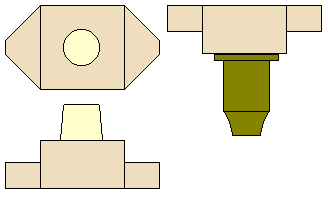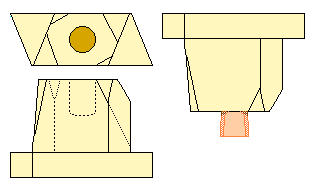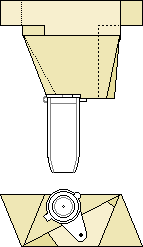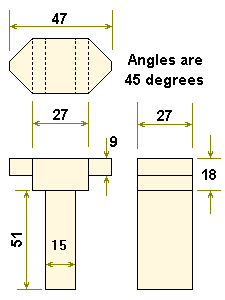There are many types of incompatible plastic Queen Rearing Gadgets. The wooden blocks illustrated here allow all of them to be utilised within one system. The basic wooden block fits the cell space and various queen cages. The examples shown are not all illustrated at the same scale.
The block shown in the diagram left, has no direct use, but forms the basis of many of the types and variants.
The angles on this type of block are 67.5 degrees. The wood is 18 mm x 18 mm and the length is 51 mm.
The cell cup shown is the JZ/BZ type (available in many colours). This 67.5 degree version sits diagonally in the cell space allowing airflow and a certain amount of bee flow.
This type of block
fills the cellspace area.
It is shown with a JZ/BZ cell cup.
The block illustrated left is 28 mm deep and the recess on the underside is a tight fit on the brass tube of the
cell punches that are available from the
appliance trade.
The left hand block is made from 18 mm plywood as the machining of the boring renders the sidewalls rather weak if ordinary timber is used.
It accepts the yellow Jenter plugs and is bored using a
Bradrad cutter.
The block at right has a tapered wooden peg that engages in the recess in the bottom of the cups that are intended for mounting on an aluminium channel.
The Nicot cup fits into the basal hole in a similar manner to the cell punch.
This block has a plastic queencell shaped cell and can be used for introduction
of virgins or the re-introduction of instrumentally inseminated queens.
The cellspace blocks that are shown above, or at least those that accept plastic cups of some type, can also be used for grafting of larva by normal methods.
The blanking plug is fitted into the cell space whenever there is no active cell plug in position to obviate the production of wild comb in the space.








